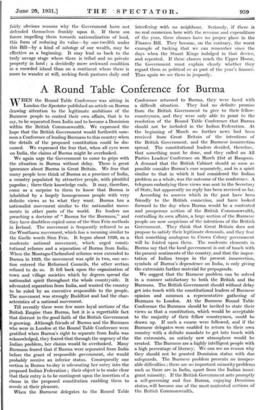A Round Table Conference for Burma
THEN the Round Table Conference was sitting in London the Spectator published an article on Burma drawing attention to the legitimate ambitions of the Burmese people to control their own affairs, that is to say, to be separated from India and to become a Dominion within the British Commonwealth. We expressed the hope that the British Government would forthwith sum- mon a Conference of leading Burmans to this country when the details of the proposed constitution could be dis- cussed. We expressed the fear that, when all eyes were on India, the claims of Burma might be overlooked.
We again urge the Government to come to grips with the situation in Burma without delay. There is great ignorance about Burma in Great Britain. We fear that many people here think of Burma as a province of India; a country populated by attractive people, with plentiful pagodas ; there their knowledge ends. It may, therefore, come as a surprise to them to know that Burma is inhabited by a largely homogeneous people with very definite views as to what they want. Burma has a nationalist movement similar to the nationalist move- ments in other parts of the world. Its leaders are preaching a doctrine of ". Burma for the Burmans," and they have doubtless copied some of the Sinn Fein methods in Ireland. The movement is frequently referred to as the Wunthanu movement, which has a meaning similar to the Gaelic words Sinn Fein. It began about 1920, as a moderate national movement, which urged consti- tutional reforms and a separation of Burma from India. When the Montagu-Chelmsford reforms were extended to Burma in 1923, the movement was split in two, one sec- tion entered the Reformed Councils, the other section refused to do so. It fell back upon the organization of town and village societies which by degrees spread the nationalist spirit throughout the whole countryside. It advocated separation from India, and wanted the country to be ruled by an executive responsible to the people. The movement was strongly Buddhist and had the char- acteristics of a national movement.
Till recently there were fcw more loyal sections of the British Empire than Burma, but it is a regrettable fact that distrust in the good faith of the British Government is growing. Although friends of Burma and the Burmans who were in London at the Round Table Conference were gratified when Burma's right to separate from India was acknowledged, they feared that through the urgency of the Indian problem, her claims would be overlooked. Many Burmans feared that if Burma were separated from India before the grant of responsible government, she would probably receive an inferior status. Consequently one section in Burma to-day is advocating her entry into the proposed Indian Federation ; their object is to make clear that their entry is to be contingent upon the insertion of a clause in the proposed constitution enabling them to secede at their pleasure.
When the Burmese delegates to the Round Table Conference returned to Burma, they were faced with a difficult situation. They had no definite promise from the British Government to give to their fellow- countrymen, and they were only able to point to the resolution of the Round Table Conference that Burma should not be included in the Indian Federation. At the beginning of March no further news had been received from Great Britain of the intentions of the British Government, and the Burmese insurrection spread. The constitutional leaders decided, therefore, that something must be done, and they called an All Parties Leaders' Conference on March 21st at Rangoon. A demand that the British Cabinet should as soon as possible consider Burma's case separately, and in a spirit similar to that in which it had considered the Indian problem as a whole, was the outcome of the conference. A telegram embodying these views was sent to the Secretary of State, but apparently no reply has been received so far.
According to sources which in the past have been friendly to the British connexion, and have looked forward to the day when Burma would be a contented and prosperous section of the British Commonwealth, controlling its own affairs, a large section of the Burmese people are now suspicious of the intentions of the British Government. They think that Great Britain does not propose to satisfy their legitimate demands, and they fear that something analogous to Crown Colony government will be foisted upon them. The moderate elements in Burma say that the local government is out of touch with the present sentiments of the country, and that the impor- tation of Indian troops in the present insurrection, symbols of Burma's dependence on India, is only giving the extremists further material for propaganda.
We suggest that the Burmese problem can be solved in a manner- satisfactory to both the British and the Burmans. The British Government should without delay get into touch with the constitutional leaders of Burmese opinion and summon a representative gathering of Burmans to London. At the Burmese Round Table Conference the Burmans should be invited to state their views so that a constitution, which would be acceptable to the majority of their fellow countrymen, could be drawn up. If such a course were followed, and if the Burmese delegates were enabled to return to their own country with a definite mandate to get into touch with the extremists, an entirely new atmosphere would be created. The Burmese are a highly intelligent people with a high percentage of literacy. We can see no reason why they should not be granted Dominion status with due safeguards. The Burmese problem presents no insuper- able difficulties ; there are no important minority problems such as there are in India, apart from the Indian immi- grant minority. If the British Government acts promptly a self-governing and free Burma, enjoying Dominion status, will become one of the most contented sections of the British Commonwealth.










































 Previous page
Previous page